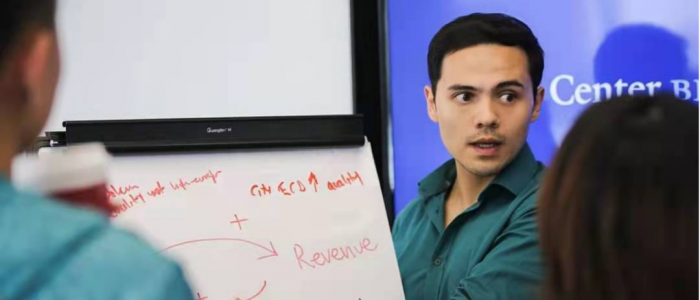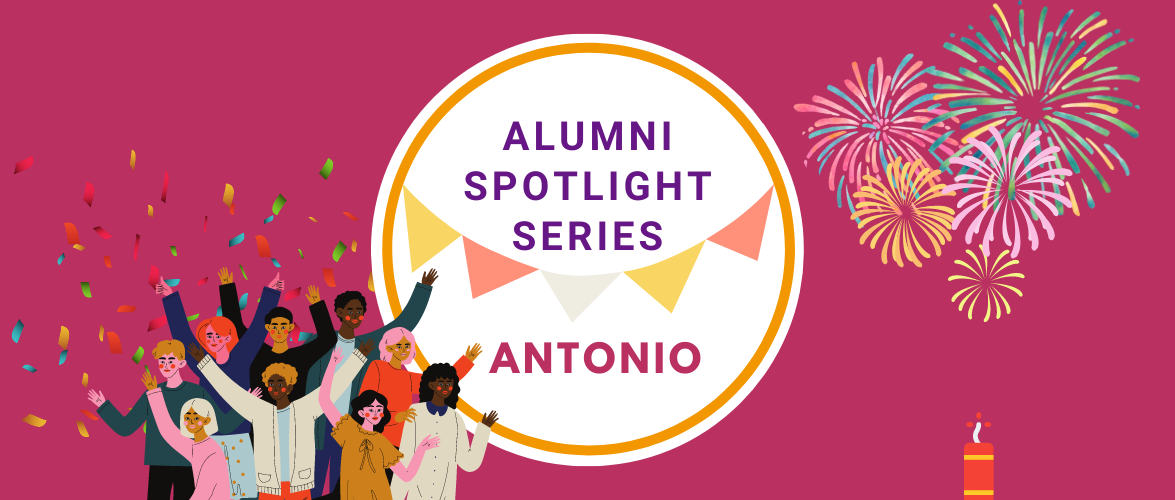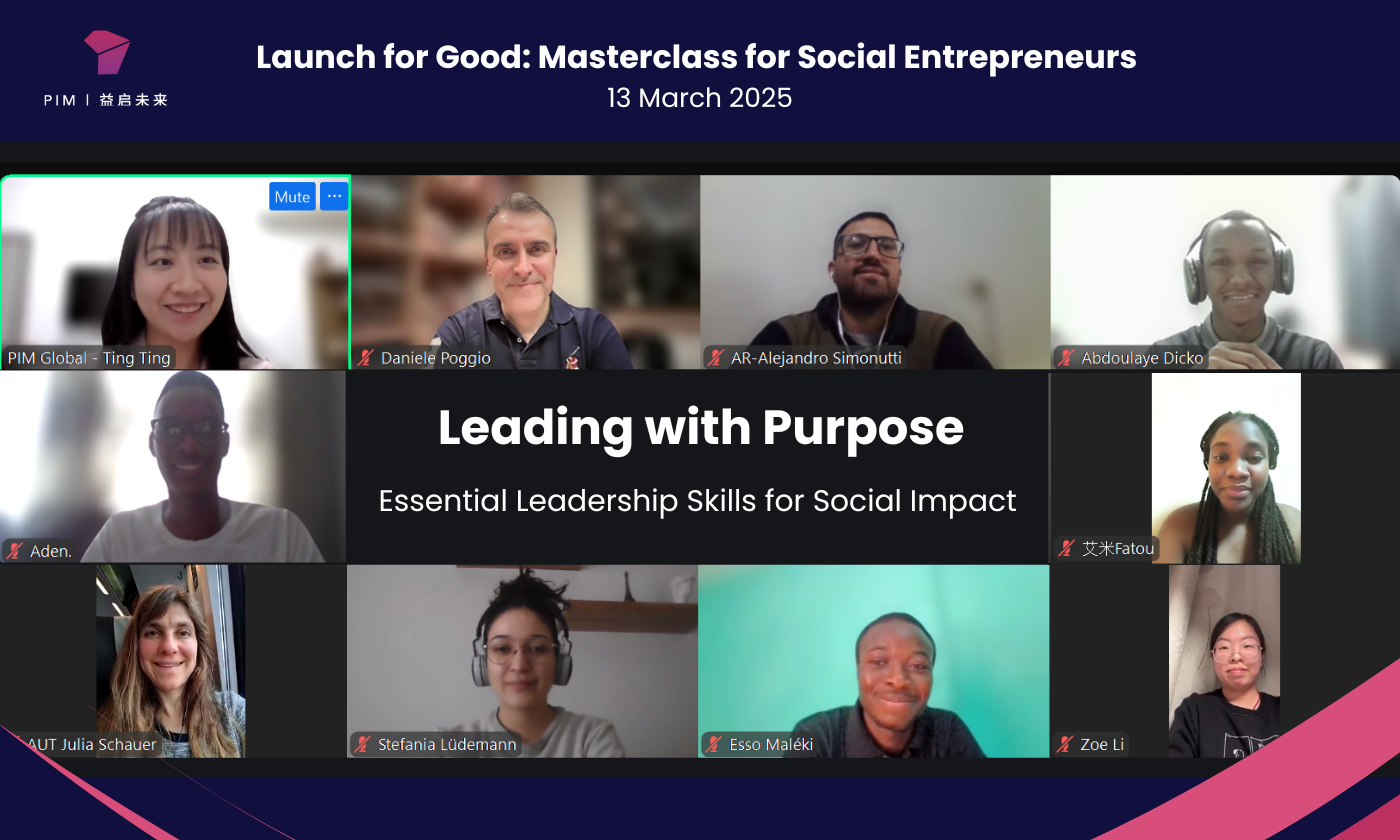The “Pimsters In Motion” Alumni Spotlight Series aims to showcase our outstanding alumni around the globe and the ways in which these young changemakers have dedicated their time to social innovation and social impact.
Today the featured Pimster is Antonio, a Program Management intern at PIM from 2017-2018. As a young boy growing up in Mexico, Antonio read a lot about mythology and archaeology stories. He knew that he would like to explore the world’s history and culture someday. Therefore, he has not only mastered English and Chinese but also studied Italian and Portuguese during high school. In 2011, he came to China to study Chinese and later graduated with a Bachelor’s degree in International Politics, and a Master’s Degree in History and Archeology from Peking University. Now working as a Public Affairs Manager at Huawei, Antonio helps implement Corporate Social Responsibility (CSR) programs in the Latin America and the Caribbean (LAC) region.


Q1: Growing up in Mexico, so far away from China both physically and linguistically, what inspired you to learn Chinese and eventually come here?
When I was a kid, I would read a lot about Greek mythology, Egyptian mythology, and archaeology. Instead of asking my dad to buy comics books for me, I would ask him to buy me archaeology magazines. So I always felt attracted towards other countries cultures and history.
I knew that if I wanted to learn about the world, I would need to learn languages. When I was in high school, I had already studied English, Portuguese and Italian. These languages are what we call Latin languages, which are very similar to Spanish because they all have the same origin. For me, learning Italian and Portuguese was easy and at some point, it became very boring. I wanted to learn other languages that were more challenging and probably would open a bigger window for me to learn more about the world. I found Portuguese or Italian to be a window of a world that I was very familiar with, which is the western world. Right now I feel how wrong I was because the western world is also very diverse. But back then, I wanted to learn something else so I tried Russian, Japanese, and Chinese. And I loved learning Chinese from the very beginning. The tones, the pronunciation, the characters……all of these elements are something that we do not have in the Latin languages. It took me out of my comfort zone and to a completely new world.
I had a lot of fun exploring the Chinese language and the Chinese world. So it became my passion. Later I got a scholarship from the Chinese office for the promotion of Chinese culture to study for 1 year at Beijing Language and Culture University.
After that one year in Beijing, I came back to do my second-year bachelor’s here in Mexico. I was not happy to be back in the same place. I wanted to go back to China and continue learning Chinese and exploring the Chinese culture. So I applied to study at Peking University and got accepted after finishing the preparatory course.

Q2: You got to know PIM when you were an undergraduate at Peking University, and you started interning here. Can you share more about what your experience was like?
My experience at PIM was a remarkable stage of my life so far. First of all, my experience of PIM was my very first professional experience outside the campus. So that was very important for me and I think it shaped me in a lot of ways. The culture, the working team, the spirit of the corporation…I think that echoed a lot in me and I felt very identified with all of that. Engagement, respect, empathy, encouragement…it was a great experience in a professional setting.
Second, I learned a lot of things when I was working at PIM. Things that I learned at PIM are very useful and applicable that I can apply to other experiences. I have learned how to address corporate social responsibility, for instance, being able to identify the relevance of a program, assess the impact of a programbeing and be aware of the accountability of different stakeholders of a program. The education that I received from PIM is very valuable. It has helped me a lot in my job right now in CSR here in Huawei.

Q3:Why did you study Archeology as your Master’s degree and then choose to work in technology?
It was very funny because just as you mentioned, I studied archaeology. Archaeology is studying the past and studying how humans have evolved through the creation of new technologies. I did research on an archaeological site that is called Shi Mao in Shanxi province. Part of my research was assessing what was the value of that archaeological site and what made it unique so that it could be eligible for nomination of World Heritage Site by UNESCO. During these researches, I realized these archaeological sites were very important for the history of China because these archaeological sites mean a turning point in the technology of ancient China. In these archaeological sites, you can find some of the earliest examples of some technologies and techniques used in ancient China that were related to the development of civilization in China.
I was very interested in how new technologies have pushed humans to develop into a more complex and prosperous society. Huawei is one of the leading companies that is creating new technologies precisely for these new developments of human civilization. So I was dragged towards that. I wanted to go from studying how in the past humans were using new technologies to evolve into how in the present humans are creating new technologies for the future. I wanted to experience that part of the history and evolution of human civilization.
Furthermore, ever since I interned at PIM, I had a great interest in everything related to social impact and education. A big part of this role as public affairs manager in Huawei is also managing educational, social impact, and CSR programs. These are the two main reasons why I felt attracted to this position at Huawei.


Q4: You are currently working as a Public Affairs Manager for the Latin America region at Huawei. Can you tell us more about what you do?
In public affairs, we manage institutional relations of Huawei with other organizations, government, media, universities, etc. Part of my job here is managing some of the Corporate Social Responsibility (CSR) projects. I work in the regional office so all the things that I do are targeting Latin America and the Caribbean region.
It is a very exciting moment to be part of Huawei right now. Huawei has incorporated social responsibility and sustainable development practices into its activities since its inception, and some of its biggest educational programs have been operating for more than 10 years. For example, Seeds for the Future, the program that PIM is a partner of.

Q5: Can you introduce a bit more about Huawei’s signature CSR initiative — the Seeds for the Future program? This program works with university students across 150+ countries around the world, and is the program that you and your team invited PIM to work on?
This program aims to develop skilled, lCT (local information and communication technologies) talent and bridge communication between countries and cultures. Seeds for the Future is making students aware of the new world and the future of the world through technology. We believe that, as future leaders of the sector in their countries, the students do not all need to know about technology per se. However, they need to be culturally aware, need to be socially aware, and need to know how to use technology for a social cause. Seeds for the Future wants to inspire them to be more inclusive tech leaders of their sectors.
This program has been running for already 12 years. So this is not new in Huawei. And But currently, they are encouraging us to continue working on this and trying to find ways to make it more interactive. We would like to see joining forces, joining experiences, and joining resources for a greater impact. That’s why we think PIM was a good partner for this program.

Q6: How do you plan to continue your work in social impact?
I believe that companies are great players in the market, and they should have a bigger role in social impact and bigger contributions to society. The resources that companies have are huge and the responsibilities that they have towards society are also huge. So far I believe that Huawei is a great platform. Huawei is taking very seriously its responsibility towards societies, not only here in Latin America but also everywhere in the world. We serve in more than 170 countries and regions in the world. In each of these countries and regions, we have a huge social responsibility to fulfill. So I’m very happy that Huawei is taking the lead and I’m happy to continue working here driving that contribution from the private sector towards society.




